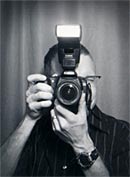Ansel Adams on "Good Photographs"
There are no rules for good photographs, there are only good photographs.- Ansel Adams
Random photo-related musings along with my joys and woes as a photographer trying to manage teaching, making photos, family, and life.
There are no rules for good photographs, there are only good photographs.- Ansel Adams
Posted by Steve Stenzel at 2:31 PM 0 comments
Labels: Ansel Adams, Quote
This is inspiring to me and depressing to me at the same time:
Posted by Steve Stenzel at 10:28 AM 0 comments
Labels: Inspiration, Video

Rule #1: There are no rules. There are as many ways to make a film as there are potential filmmakers. It’s an open form. Anyway, I would personally never presume to tell anyone else what to do or how to do anything. To me that’s like telling someone else what their religious beliefs should be. Fuck that. That’s against my personal philosophy—more of a code than a set of “rules.” Therefore, disregard the “rules” you are presently reading, and instead consider them to be merely notes to myself. One should make one’s own “notes” because there is no one way to do anything. If anyone tells you there is only one way, their way, get as far away from them as possible, both physically and philosophically.
Rule #2: Don’t let the fuckers get ya. They can either help you, or not help you, but they can’t stop you. People who finance films, distribute films, promote films and exhibit films are not filmmakers. They are not interested in letting filmmakers define and dictate the way they do their business, so filmmakers should have no interest in allowing them to dictate the way a film is made. Carry a gun if necessary.
Also, avoid sycophants at all costs. There are always people around who only want to be involved in filmmaking to get rich, get famous, or get laid. Generally, they know as much about filmmaking as George W. Bush knows about hand-to-hand combat.
Rule #3: The production is there to serve the film. The film is not there to serve the production. Unfortunately, in the world of filmmaking this is almost universally backwards. The film is not being made to serve the budget, the schedule, or the resumes of those involved. Filmmakers who don’t understand this should be hung from their ankles and asked why the sky appears to be upside down.
Rule #4: Filmmaking is a collaborative process. You get the chance to work with others whose minds and ideas may be stronger than your own. Make sure they remain focused on their own function and not someone else’s job, or you’ll have a big mess. But treat all collaborators as equals and with respect. A production assistant who is holding back traffic so the crew can get a shot is no less important than the actors in the scene, the director of photography, the production designer or the director. Hierarchy is for those whose egos are inflated or out of control, or for people in the military. Those with whom you choose to collaborate, if you make good choices, can elevate the quality and content of your film to a much higher plane than any one mind could imagine on its own. If you don’t want to work with other people, go paint a painting or write a book. (And if you want to be a fucking dictator, I guess these days you just have to go into politics...).
Rule #5: Nothing is original. Steal from anywhere that resonates with inspiration or fuels your imagination. Devour old films, new films, music, books, paintings, photographs, poems, dreams, random conversations, architecture, bridges, street signs, trees, clouds, bodies of water, light and shadows. Select only things to steal from that speak directly to your soul. If you do this, your work (and theft) will be authentic. Authenticity is invaluable; originality is nonexistent. And don’t bother concealing your thievery—celebrate it if you feel like it. In any case, always remember what Jean-Luc Godard said: “It’s not where you take things from—it’s where you take them to.”
Posted by Steve Stenzel at 7:24 PM 0 comments
Labels: Inspiration, Lesson, Quote
Ilford photo paper / film and a Pentax camera from Things Organized Neatly:


Posted by Steve Stenzel at 7:28 AM 1 comments
Labels: Funny
The advice I like to give young artists, or really anybody who’ll listen to me, is not to wait around for inspiration. Inspiration is for amateurs; the rest of us just show up and get to work. If you wait around for the clouds to part and a bolt of lightning to strike you in the brain, you are not going to make an awful lot of work. All the best ideas come out of the process; they come out of the work itself. Things occur to you. If you’re sitting around trying to dream up a great art idea, you can sit there a long time before anything happens. But if you just get to work, something will occur to you and something else will occur to you and something else that you reject will push you in another direction. Inspiration is absolutely unnecessary and somehow deceptive. You feel like you need this great idea before you can get down to work, and I find that’s almost never the case.- Chuck Close
Posted by Steve Stenzel at 8:08 PM 0 comments
Labels: Inspiration, Quote

© Blogger template 'Minimalist F' by Ourblogtemplates.com 2008
Back to TOP